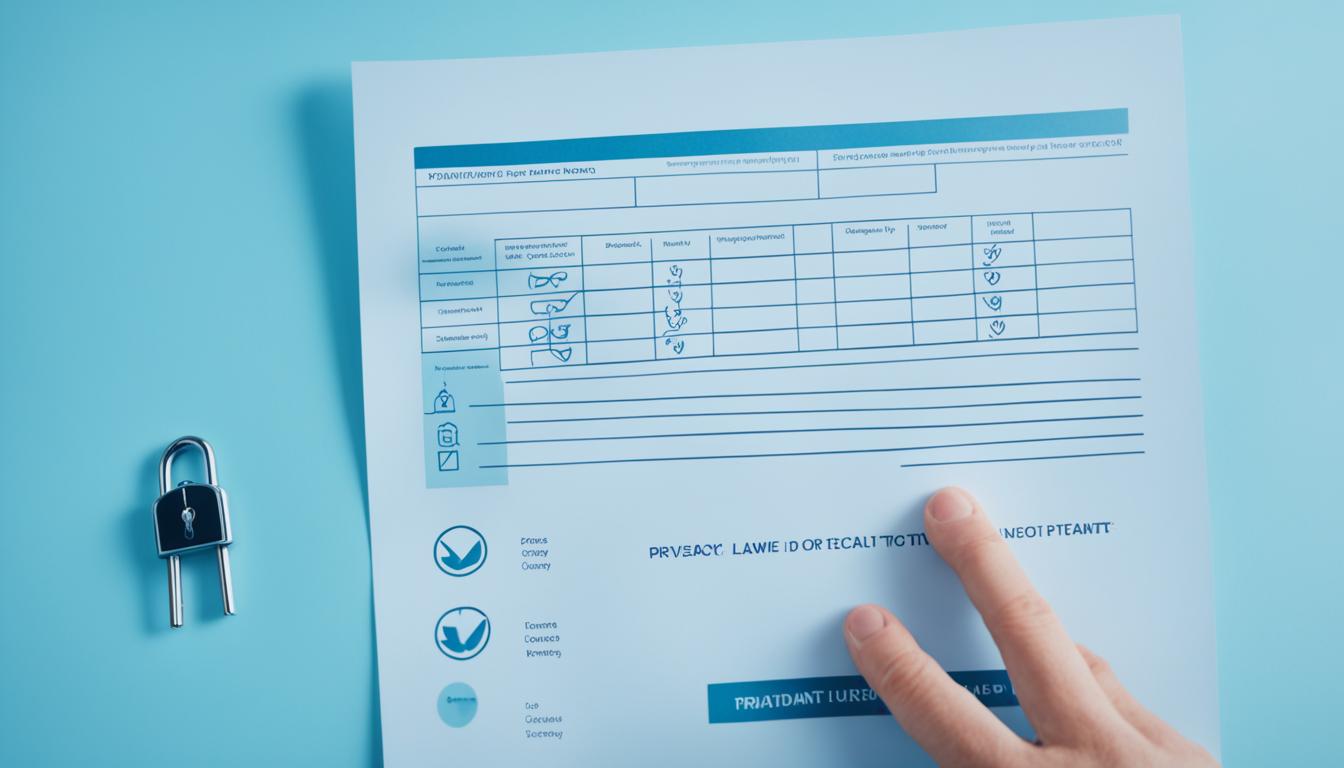The global healthcare market is experiencing a rapid transformation, with new startups and scaleups disrupting traditional practices. In this evolving landscape, healthcare businesses must navigate the complexities of privacy laws to ensure compliance and protect patient data.
Privacy laws play a crucial role in guiding healthcare marketing practices. Understanding and adhering to these regulations is essential for healthcare organizations to build trust with patients and healthcare providers while driving effective marketing strategies.
Key Takeaways:
- Privacy laws are essential in creating a secure and trustworthy healthcare marketing environment.
- Key global regulations, including HIPAA, CCPA, and GDPR, shape healthcare marketing practices.
- Healthcare marketers must stay aware of country-specific and state-specific regulations.
- Data privacy challenges in healthcare marketing can be overcome with responsible data management practices.
- The future of privacy laws in healthcare marketing will be influenced by technology advancements and changing consumer expectations.
The Challenges of Privacy Laws in Health Care Marketing
The healthcare industry faces several challenges when it comes to privacy laws in marketing. Outdated privacy protections have become a central issue, and it is difficult for regulatory bodies to keep up with the increasing prevalence of healthcare data sharing. Striking a balance between privacy and healthcare advancements is also a notable challenge. Healthcare organizations must ensure they protect personally identifiable information and personal health information to prevent data breaches. As online data tracking and sharing methods continue to evolve, new privacy challenges arise. Adhering to privacy laws and building patient trust are crucial in the healthcare marketing industry.
| Challenges | Impact |
|---|---|
| Outdated privacy protections | Increased vulnerability to data breaches and unauthorized access |
| Striking a balance between privacy and healthcare advancements | Ensuring patient confidentiality while leveraging data for improved healthcare outcomes |
| Protecting personally identifiable information and personal health information | Prevention of data breaches and safeguarding patient privacy |
| Evolution of online data tracking and sharing methods | New privacy challenges and risks of unauthorized data access |
| Adhering to privacy laws | Avoiding legal and financial consequences |
| Building patient trust | Establishing credibility and fostering long-term patient relationships |
Note: The challenges listed above are not exhaustive but represent some of the significant obstacles faced by the healthcare industry in navigating privacy laws in marketing.
Navigating Compliance in Health Care Marketing
Healthcare organizations operating in a rapidly evolving global landscape must navigate a complex and inconsistent privacy environment. Compliance with privacy policies in healthcare and legal requirements for healthcare marketing is crucial to protect personal data and maintain patient trust. This section explores the various regulations that healthcare organizations must adhere to and the measures they can take to ensure compliance.
Understanding Global and Local Regulations
Healthcare marketers face a multitude of regulations governing privacy and data protection. These include the Health Insurance Portability and Accountability Act (HIPAA), the General Data Protection Regulation (GDPR), and state-specific laws. HIPAA safeguards sensitive patient health information in the United States, while GDPR modernizes data protection laws in the European Union. Healthcare organizations must stay updated on country-specific and state-specific regulations to ensure compliance.
Compliance Best Practices
To navigate compliance requirements, healthcare organizations should implement systematic data collection processes. This involves following approved data collection methods, data hygiene practices, and audience targeting guidelines. Organizations must prioritize the protection of personal data by employing secure transfer protocols, data encryption, and robust privacy policies.
Consent-based digital engagements with patients and healthcare providers play a vital role in avoiding compliance issues and protecting data privacy. Obtaining explicit consent and providing transparent information about data usage enhance compliance and build trust.
Ensuring Campaign Impact Tracking
Tracking the impact of healthcare marketing campaigns is an essential aspect of compliance. By monitoring the performance of campaigns, organizations can assess their effectiveness and make necessary adjustments. This involves tracking campaign metrics such as reach, engagement, and conversion rates while ensuring that data collection methods comply with privacy regulations.
Key Privacy Regulations in Health Care Marketing
| Regulation | Description |
|---|---|
| HIPAA | A US federal law protecting sensitive patient health information |
| GDPR | A European Union regulation modernizing data protection laws |
| State-specific laws | Laws specific to individual states within the United States |
Understanding and complying with these regulations is crucial to ensure the privacy and security of patient data throughout the marketing process.
Building Trust in Health Care Marketing
Building trust is a crucial aspect of healthcare marketing. It is essential for healthcare organizations to establish themselves as trusted authorities by providing valuable information and educational resources through email marketing.
By delivering personalized and relevant content to patients and healthcare providers at critical moments of care, trust can be built. This customer-centric approach enhances the patient’s journey towards improved health and fosters a strong relationship between physicians and healthcare organizations.
Trustworthy marketing practices not only demonstrate healthcare marketing ethics but also play a vital role in establishing credibility and loyalty with patients and healthcare providers.
Personalized Content for Building Trust
Personalization is a powerful tool in healthcare marketing. By tailoring content based on individual needs and preferences, healthcare organizations can create targeted and meaningful engagements that resonate with patients and healthcare providers.
Whether it’s delivering personalized treatment options, wellness tips, or reminders for preventive care, healthcare marketers can leverage data-driven insights to provide relevant and timely information.
Here is an example of how personalized content can be used:
- A diabetic patient receives an email with tips for managing blood sugar levels
- A pregnant woman receives an email with information about prenatal care and nutrition
- A healthcare provider receives a newsletter highlighting the latest medical research in their specialty
Case Study: Trust-building through Personalized Content
“Evergreen Healthcare, a leading healthcare organization, has successfully implemented a personalized content strategy to build trust with their patients. By harnessing patient data and employing data analytics, they have been able to create customized email campaigns that cater to individual patient needs. The result? Increased patient engagement, improved health outcomes, and a stronger relationship between patients and their healthcare providers.”
– Jane Thompson, Marketing Director at Evergreen Healthcare
Through their data-driven approach, Evergreen Healthcare has demonstrated their commitment to the well-being of their patients and established themselves as a trusted source for healthcare information. This trust has not only improved patient satisfaction but has also contributed to better healthcare outcomes.
Benefits of Personalized Content in Trust-building
| Benefits | Examples |
|---|---|
| Improved Patient Engagement | Higher open rates and click-through rates for personalized emails |
| Enhanced Patient Satisfaction | Positive patient feedback on receiving relevant and timely information |
| Increased Brand Credibility | Patients view the healthcare organization as a trusted authority in their field |
| Improved Health Outcomes | Patients are more likely to follow treatment plans and preventive care guidelines |
By investing in personalized content and leveraging patient data ethically, healthcare organizations can build trust, strengthen patient relationships, and ultimately drive better health outcomes.

Safeguarding Data Privacy in Health Care Marketing
Healthcare organizations understand the importance of safeguarding data privacy in their marketing efforts. By adopting best practices for healthcare data security, organizations can mitigate the risk of data breaches and ensure the safety of sensitive patient information.
One effective measure is the use of electronic medical documentation, which reduces the reliance on paper-based records that can be lost or mishandled. Electronic documentation provides enhanced security measures, such as encryption and user access controls, to protect patient data.
To further protect data privacy, healthcare organizations can implement differential privacy techniques. Differential privacy is a statistical approach that adds noise to data to protect individual privacy while still allowing for accurate analysis and insights. This method ensures that the privacy of patients is maintained during data collection and analysis processes.
Educating staff and patients about privacy laws and regulations is also crucial in safeguarding data privacy. By providing training and clear guidelines, healthcare organizations can ensure that everyone involved understands their responsibilities in protecting patient data.
Staying ahead of changes in privacy regulations is essential for healthcare organizations. Compliance with data sharing regulations, such as HIPAA, ensures that patient data is handled and shared appropriately. Regular audits and assessments can help identify any gaps in compliance and enable organizations to take corrective actions.
In summary, safeguarding data privacy in healthcare marketing requires a comprehensive approach. By adopting best practices, educating stakeholders, and ensuring compliance with regulations, healthcare organizations can maintain the integrity of their IT systems and protect patient data.
Best Practices for Safeguarding Data Privacy
| Best Practice | Description |
|---|---|
| Use electronic medical documentation | Replace paper-based records with secure electronic systems to protect patient data from loss or mishandling. |
| Implement differential privacy | Add noise to data analysis to protect individual privacy while maintaining accurate insights. |
| Educate staff and patients | Provide training and clear guidelines on privacy laws and regulations to ensure everyone understands their responsibilities. |
| Stay ahead of changes | Maintain compliance with evolving privacy regulations and proactively address any gaps. |
“Protecting patient data is not just a matter of compliance; it is our ethical responsibility as healthcare marketers. By implementing robust data privacy measures, we can build trust with patients and ensure the integrity of our marketing efforts.” – Dr. Emily Johnson, Chief Marketing Officer
The Future of Privacy Laws in Health Care Marketing
The future of privacy laws in health care marketing is constantly evolving, driven by advancements in technology and shifting consumer expectations. As data privacy concerns continue to grow, it is crucial for healthcare organizations to prioritize ethical marketing practices and ensure compliance with ever-changing regulations. Adapting to this rapidly changing landscape is essential for maintaining effective and ethical marketing strategies.
One potential development in the healthcare marketing industry is the rise of consent-based data sharing. As individuals become more aware of their data privacy rights, organizations may need to seek explicit consent before collecting and utilizing personal information for marketing purposes. This shift towards greater transparency and control over personal data will allow healthcare marketers to build trust and create more personalized marketing experiences.
Targeted marketing strategies are also likely to evolve as privacy laws continue to shape the industry. By leveraging data analytics and AI technologies, healthcare marketers can deliver relevant and tailored content to specific target audiences. This approach not only improves the effectiveness of marketing efforts but also enhances the overall patient experience by providing personalized information and services.
Staying informed about healthcare marketing trends and familiarizing oneself with data privacy regulations will be critical for navigating the future landscape. Healthcare organizations should regularly update their policies, procedures, and data management practices to align with emerging privacy laws. Continuous education and training for marketing teams will help ensure compliance and ethical decision-making.

The Importance of Responsible Data Management in Health Care Marketing
Responsible data management plays a critical role in health care marketing. As healthcare organizations strive to deliver high-quality care and personalized experiences, they must also prioritize data privacy and protection. By implementing responsible data management practices, they can optimize patient care while safeguarding sensitive information.
In the rapidly evolving landscape of data privacy regulations in healthcare, collaboration between healthcare organizations, regulatory bodies, technology providers, and researchers is essential. Together, they can create a privacy culture that balances the need for data flow with the imperative to protect patient confidentiality.
Understanding the dynamic privacy law landscape and the healthcare data ecosystem is crucial for healthcare marketers. Compliance with regulations like HIPAA is just the beginning. Marketers must also overcome obstacles in deriving actionable insights from large datasets, ensuring that data-driven strategies are in line with privacy regulations.
The Benefits of Responsible Data Management
Responsible data management not only ensures compliance with data privacy regulations but also brings several benefits to health care marketing:
- Enhanced patient trust: By prioritizing data privacy and security, healthcare organizations can build trust with patients, who are increasingly concerned about the protection of their personal information.
- Improved campaign effectiveness: By managing data responsibly, healthcare marketers can gain valuable insights into patient behavior, preferences, and needs. This enables the design of targeted campaigns that resonate with their target audience.
- Streamlined operations: Effective data management reduces the risk of data breaches and ensures the integrity and accuracy of patient data. This streamlines operations, improves efficiency, and enhances overall patient care.
- Legal compliance: Adhering to data privacy regulations reduces the risk of penalties and legal consequences, helping healthcare organizations avoid costly fines and reputational damage.
Responsible data management is a collective effort that requires ongoing education and training. By keeping up with the evolving privacy laws and regulations, healthcare marketers can ensure they are at the forefront of responsible data practices.
“Responsible data management not only ensures compliance with regulations but also builds trust with patients and enables more effective marketing campaigns.” – [Author Name]
By embracing responsible data management practices, healthcare organizations can optimize patient care, protect data privacy, and build trust with patients and healthcare providers.
| Key Elements of Responsible Data Management | Benefits |
|---|---|
| Implementing robust data security measures | Protection against data breaches and unauthorized access |
| Obtaining informed consent from patients for data collection and use | Establishes transparency and builds trust with patients |
| Ensuring data accuracy and integrity | Improves the quality of patient care and decision-making processes |
| Regularly auditing data management practices | Identifies and addresses potential vulnerabilities and risks |
Conclusion
Navigating privacy laws in health care marketing is a complex yet essential task for healthcare organizations. By understanding and complying with regulations like HIPAA, CCPA, and GDPR, organizations can ensure the protection of sensitive patient information and establish trust with patients and healthcare providers. Data privacy challenges can be overcome through the adoption of best practices, the education of staff and patients, and staying informed about changes in privacy regulations.
The future of privacy laws in health care marketing will continue to evolve as technology advances and consumer expectations change. To maintain effective and ethical marketing strategies, healthcare marketers must prioritize responsible data management and compliance with evolving regulations. Consent-based data sharing and targeted marketing strategies may further develop, requiring marketers to stay informed and adapt to the changing privacy landscape.
Responsible data management plays a crucial role in health care marketing. By collaborating with regulatory bodies, technology providers, and researchers, healthcare organizations can create a privacy culture that protects sensitive data while facilitating the flow of critical patient care information. Understanding the dynamic privacy law landscape and implementing responsible data management practices are vital for compliance and optimizing patient care while safeguarding data privacy.
FAQ
What are the key privacy laws that guide healthcare marketing?
The key privacy laws that guide healthcare marketing are HIPAA, CCPA, and GDPR.
What does HIPAA stand for, and what does it protect?
HIPAA stands for Health Insurance Portability and Accountability Act. It protects sensitive patient health information.
What is CCPA, and what does it provide?
CCPA stands for California Consumer Privacy Act. It gives consumers control over their personal information collected by businesses.
What does GDPR stand for?
GDPR stands for General Data Protection Regulation. It modernizes the laws around the protection of personal data.
Are there specific regulations for healthcare marketing at the country and state levels?
Yes, there are country-specific and state-specific regulations that healthcare marketers must be aware of in addition to global regulations.
What advertising regulations do digital platforms like Google have?
Digital platforms like Google have their own advertising regulations, including restrictions on language content and health claims.
What are the challenges faced by the healthcare industry regarding privacy laws in marketing?
The healthcare industry faces challenges with outdated privacy protections, difficulty in keeping up with healthcare data sharing, and balancing privacy and healthcare advancements.
How can healthcare organizations protect patient data and prevent data breaches?
Healthcare organizations can protect patient data and prevent data breaches by ensuring they have systematic data collection processes, transfer protocols, encryption methods, and compliance with privacy laws.
How can healthcare organizations build trust in healthcare marketing?
Healthcare organizations can build trust by providing valuable information and resources through email marketing, delivering personalized and relevant content, and focusing on a customer-centric approach to drive better healthcare outcomes.
What proactive steps can healthcare organizations take to safeguard data privacy in marketing?
Healthcare organizations can take proactive steps such as adopting best practices for healthcare data security, using electronic medical documentation, implementing differential privacy, educating staff and patients about privacy laws, and staying ahead of changes in privacy regulations.
How do data privacy concerns impact the future of healthcare marketing?
Data privacy concerns will shape the future of healthcare marketing, leading to the prioritization of ethical marketing practices, consent-based data sharing, and targeted marketing strategies that comply with evolving regulations.
How can responsible data management optimize patient care and protect data privacy?
Responsible data management practices in healthcare marketing involve collaboration between healthcare organizations, regulatory bodies, technology providers, and researchers. It ensures a privacy culture that protects sensitive data while allowing the flow of essential patient care information.
How can healthcare organizations navigate privacy laws in marketing?
Healthcare organizations can navigate privacy laws by understanding and complying with regulations like HIPAA, CCPA, and GDPR, adopting best practices, educating staff and patients, and staying updated with changes in privacy regulations.








